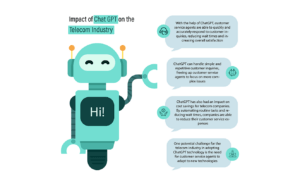The telecommunications industry is one that is constantly evolving and adapting to new technologies. With the rise of artificial intelligence (AI) and machine learning, the industry has seen a significant impact with the introduction of Chat Generative Pretrained Transformer (ChatGPT) technology. This technology has revolutionized the way in which customer service is provided in the telecom industry, providing a more efficient and personalized experience for customers.

One of the most significant impacts of ChatGPT on the telecom industry is the improvement of customer service. With the help of ChatGPT, customer service agents are able to quickly and accurately respond to customer inquiries, reducing wait times and increasing overall satisfaction. ChatGPT is trained on vast amounts of data, which allows it to provide accurate and relevant information to customers, even in real-time. This has resulted in faster resolution times and improved customer satisfaction ratings.
Another impact of ChatGPT in the telecom industry is the automation of routine tasks. ChatGPT can handle simple and repetitive customer inquiries, freeing up customer service agents to focus on more complex issues. This not only improves the efficiency of customer service but also provides a more seamless and streamlined experience for customers. ChatGPT can also provide 24/7 support, allowing customers to receive assistance at any time of the day or night.
In addition to improving customer service, ChatGPT has also had an impact on cost savings for telecom companies. By automating routine tasks and reducing wait times, companies are able to reduce their customer service expenses. ChatGPT technology also requires less training and maintenance compared to traditional customer service systems, resulting in further cost savings for companies.
One potential challenge for the telecom industry in adopting ChatGPT technology is the need for customer service agents to adapt to new technologies and workflows. However, as ChatGPT becomes more widely adopted, customer service agents will become increasingly familiar with the technology and be able to use it more effectively.
In conclusion, the impact of ChatGPT on the telecom industry has been substantial, improving customer service and reducing costs for companies. As the technology continues to evolve and improve, it is likely to become even more widespread in the telecom industry and play a crucial role in shaping the future of customer service.
Ethical Dilemma!
The use of Chat Generative Pretrained Transformer (ChatGPT) technology in the telecom industry also raises some ethical dilemmas. Here are some of the potential ethical challenges that the telecom industry may face with the adoption of ChatGPT:
- Privacy concerns: One of the primary concerns surrounding ChatGPT technology is the protection of customer data. The vast amount of data that ChatGPT is trained on raises questions about who has access to this information and how it is being used. It is essential for telecom companies to have robust privacy policies in place to ensure that customer data is protected and not used for any unauthorized purposes.
- Bias and discrimination: ChatGPT is trained on vast amounts of data, which means it may perpetuate existing biases and discrimination in society. This can lead to unequal treatment of customers and result in a negative impact on customer satisfaction. It is important for companies to regularly evaluate and address potential biases in their ChatGPT systems to ensure fair and equal treatment of all customers.
- Job loss: The automation of routine tasks through ChatGPT technology may result in job loss for some customer service agents. This raises ethical questions about the responsibility of companies to support impacted employees and ensure they are not left behind as technology advances.
- Responsibility for incorrect information: ChatGPT technology is trained on vast amounts of data, but it is still possible for it to provide incorrect information. The responsibility for ensuring that customers receive accurate information must be clearly defined and shared between the company and the technology provider.
- Transparency: Companies must be transparent with customers about the use of ChatGPT technology and clearly communicate how it is being used to provide customer service. Customers have a right to know how their data is being used and who has access to it.
In conclusion, the ethical dilemmas surrounding the use of ChatGPT in the telecom industry are complex and require careful consideration and management. Companies must balance the benefits of this technology with the potential risks and take steps to ensure the responsible and ethical use of ChatGPT in their customer service operations.
